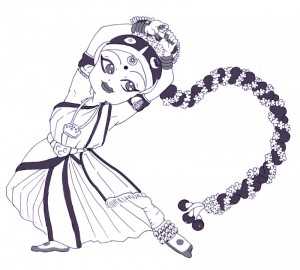Clik here to view.

Image from here.
This two-part post is about a Writ Petition filed by a Kuchipudi dancer in the Kerala High Court, alleging that video recordings of dance performances by the Petitioner’s students at a state-sponsored school competition were leaked and sold online, and agents of the State Government profited from the same. In Part I, I discussed the copyright issues surrounding the same. In this post, I discuss whether the provisions dealing with Performers’ Rights can be invoked in the Petitioner’s defense in this case.
Performer’s rights began to gain prominence in the 20th century as technology to record and broadcast performances became more advanced. As the effort to disseminate performances through technology reduced and digital dissemination grew, the performer became separate from the performance, from which arose the need to protect the rights of such performers over their performances. (Read WIPO’s brief on Performer’s Rights here).
According to S.38 of the Copyright Act, “Where any performer appears or engages in any performance, he shall have a special right to be known as the “performer’s right” in relation to such performance.” Performance, in turn, is defined as “any visual or acoustic presentation made live…” and a Performer includes a dancer. Performer’s Rights can therefore be clearly invoked in the present case.
Performers’ Rights were made more extensive in the 2012 Copyright Amendment Act. According to S.38A, the performer has the exclusive right to authorize to make a visual recording of the performance as well as to issue copies/ communicate the work to the public. The acts of the respondents clearly infringe these rights. As mentioned earlier, while the video was recorded with the consent of the performers, the distribution took place without their consent.
Just as we saw in Part I of this post that the Petitioner’s copyright claim can possibly defeated due to the performance being recorded on film, according to S.38A(2) stipulates as follows- “Once a performer has, by written agreement, consented to the incorporation of this performance in a cinematograph film he shall not, in the absence of any contract to the contrary, object to the enjoyment by the producer of the film of the performer’s right in the same film” This means that once the performance is incorporated in film, the performer’s rights cease to exist (apart from moral rights and the right to receive royalties), unless there is a contract to the contrary. Thus, although performers rights usually exists independently of copyright, it appears as if the producer of a cinematograph film enjoys not just the copyright over the film but also the performers’ rights as well, to the exclusion of the performer. On plain reading, it appears as if the Petitioner cannot object to the distribution of the video as she has consented to it being videographed.
Incidentally, prior to the 2012 Amendments, S.38 (3)(ii) provided that where a person reproduces a visual recording of a performance, if the consent for the recording was given for a different purpose than the reproduction, it would amount to infringement of the performer’s right. This provision would have squarely covered a case such as this one, where the recording was authorized but not its reproduction. However, once again, S.38(4) provided that this right would cease to exist once the performer consented to the incorporation of the performance in a cinematograph film. However, the law makes no distinction between a ‘visual recording’ and a ‘cinematograph film’. Hence, the invocation of S.38(3)(ii) would have also been severely curtailed
Therefore ultimately, the protection afforded to the Petitioner in this case, whether as a Copyright holder or as a Performer depends on how the term “cinematograph film” is interpreted. I could not come across any interpretation of the term other than the broad definition in the Copyright Act. If there is one, do let us know in the comments.
In the entertainment industry, this tangle of rights of performers, producers and other parties is managed through entities such as the IPPRs (controversies aside). However, as in this case, where the performers are mainly school children who are not profiteering in any way from their performance but still deserve to control who does watch and profit from it, it appears as if the law is against their favour.